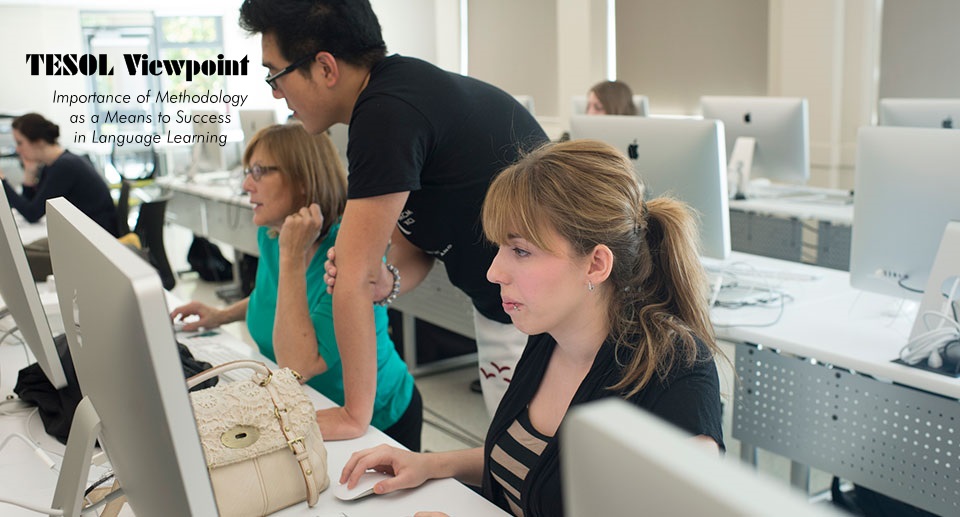TESOL Viewpoint brings alumni essays on teaching English as a second language. This viewpoint focuses on methodologies to succeed with second language learning
I started learning French when I was eleven years old and continued taking those classes on and off for ten years. But at the end of all those hours, I have little more to say than, “Bonjour!” Despite this great failure to become fluent in French, I could pass the tests. There must be something important to be learned from the fact this experience can occur. Not only can it occur, but I believe it comprises the majority of second language (L2) learning experiences in America. With this said, I know that much of my lack of retention was my fault. I was not motivated, and did not study consistently. Nevertheless, there is one thing that I will blame the schools for: allowing me to continue passing the tests. Is not the point of learning an L2, to achieve fluency? Then why is it that so many students around the world are passing tests, but demonstrate no proficiency in the language? Is it that the testing system is wrong? I believe that is part of the problem. However, there is a deeper, more fundamental issue: there is no promise in the method. No promise that blatantly says, “If you implement this method, you will become fluent.” A promise is needed.
The more students see that they are progressing in a language, the more likely it is that they will be encouraged and want to continue learning. L2 learning, especially for adults, can be grueling. From my own experience, I went out and bought a Rosetta Stone because I wanted to learn Portuguese. I had seen commercials and believed, it must be good. The truth is, Rosetta Stone is a very good program, but it does not teach a L2 student, to speak or listen in the target language. Rosetta Stone claims to give fluency after three levels. In reality, although providing basic knowledge in reading, writing, listening and speaking, a student is not even close to holding an extended conversation after three levels, let alone, being fluent. My point is this: I became discouraged when I saw that my work on Rosetta was not paying off.
For real L2 learning to take place, the student must constantly be reassured through the actual experience of success. This will most easily occur if the student is applying an effective methodology, one that is suited to their learning style and area of the L2. Students must feel that their study hours have been effective. Otherwise, why are they studying? Success drives students through L2 learning when everything seems impossible. Students need intimacy with success in their L2, and it is our job as teachers, to make that experience as attainable as possible. The only question is, “How will we do it?”
While reading through the Cambridge Guide to TESOL, I came upon a method that reminded me of how I learnt to speak and understand Portuguese. I began my studies when I was twenty-two years old, and now, three years later, Brazilians ask me all the time, if I am from Brazil. I can answer that with a resounding “Não, sou daqui!” (No, I’m from here!) Then they inevitably ask, how I learned their language? I respond, “Em casa, com meu computador.” (At home, with my computer.) How is this possible if Rosetta Stone did not work?
I learnt all of my basic phrasing and vocabulary through a program called Pimsleur. The program Pimsleur utilizes a method very similar to the Lexical Approach. Over a period of ninety lessons, the program drills the top four hundred most used words in all kinds of phrases that are common. The learner is asked to repeat new words. They are then instructed to form new sentences in the L2, using words they learned in previous lessons, while simultaneously applying the new words. It is a cyclical approach that always reintroduces words to deepen the learners’ L2 connections.
I see the Lexical Approach as being a kind of Pimsleur approach for the class. To provide an opportunity for students to become proficient in sentence headings, metaphors, expressions, and common vocabulary, is to encourage them to experiment in the L2. My experience with L2 learners is the same time and again. When the student is experiencing success in the area they targeted to succeed in, they are excited and ready to learn. But when learning is slow and grueling, the learner quickly looses focus and settles for just passing the tests.
I know from my own L2 learning experience, that for students to experience success in speaking and listening, that they must practice speaking and listening frequently. It is for this reason that I think the Lexical Approach is so suited to teaching these to aspects of language learning. For grammar, I believe that the rule about over generalizing is excellent because it will help students get the gist of what English grammar is like and then when there are exceptions, they will be able to remember specifically. I think that Craik and Lockhart’s approach of learning vocabulary through as multiple processes is excellent. It will not only vary the situations in which the vocabulary is used, but it will establish a greater network of neural connections and therefore, make retention easier. It can be seen here that methods must be applied for their intended uses. They must be combined appropriately. If these rules are followed and adhered to it will be much easier for the learner to succeed.
It is not my intention to just help students pass tests. It is my intention to give students whatever their desire is, in English. If they want to learn to speak and listen, “Let’s learn how to speak and listen!” If they want to learn to read and write, “Great! Let’s learn to read and write.” But it will never be my intention to just help students pass tests, because that is not only a waste of everyone’s time, but moreover it gives a false sense of progress.
L2 learning is about moving towards L2 fluency. The ideas that people have about fluency are different, but our job as teachers is to grant them a practical opportunity to experience this fluency to whatever extent they desire. No matter what their language learning goals are, they are almost certain to be challenging, otherwise there would be no need for our profession. I believe that we will accomplish our goals, through providing students with the opportunities to most easily succeed in their L2 endeavors. L2 learning need not be grueling and tedious, as it has been for so long. It should be enjoyable, and rewarding. When the work gets difficult, it will be the previous success that students have experienced in learning their L2 that will drive them thru. The moral boost of succeeding needs to be coupled with the most effective methodologies. This will make success more attainable and more frequent. We don’t want our students to dread class! We want them to look forward to it.
Falar Português para mim é uma dessas joias maiores na minha vida. “For me to speak Portuguese is one the greatest joys in my life.” E dar essa dão para um outro, (mas para Inglês), seria um prazer otimo. “And to give this gift to another, (but for English), will be a great pleasure.” It is with great joy, that I start my career in EFL.



